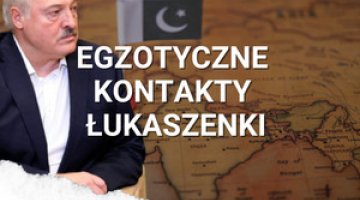Systemic crisis in Alexander Lukashenko's regime
Full text in PDF183.21 KB
Measures undertaken by the Belarusian government in the areas of the economy, internal affairs and foreign policy in recent months have proven increasingly ineffective. Despite the deteriorating macroeconomic situation, Minsk is not implementing the reforms necessary to combat the crisis and its activity is limited only to feigned actions and administrative regulations. As a result, the economic situation is worsening but the chances of obtaining external loans as support, for example from the International Monetary Fund (IMF), are decreasing. At the same time there is mounting fear among the regime of social unrest, therefore by raising salaries of the least well-off groups of citizens it is trying to compensate for the increased costs of living. On the other hand, the government is extending the scope of control over society and competences of enforcement bodies.
Belarus's room for manoeuvre in foreign policy has also been diminishing substantially. Despite the EU's declared willingness to reach an agreement and its encouragement, Lukashenko is not ready to make concessions in the political sphere (e.g. to rehabilitate political prisoners), and this is hindering the normalisation of relations with the West. Minsk furthermore feels a mounting pressure from Moscow, making the Belarusian negotiating position ever weaker.
The lack of freedom of manoeuvre in foreign policy, no possibility to maintain a costly economic model and the lack of support from the majority of society all prove that Alexander Lukashenko's regime is in severe crisis. The system he established is no longer able to respond to current threats with adequate and effective strategies. This situation is challenging the regime's stability and calls into question its viability in the longer term.
Short-term anti-crisis measures instead of a strategy for reforms
Increasing economic problems, such as the deficit of foreign currencies, a dynamic surge in the inflation rate and growing external debts have forced the Belarusian government to take anti-crisis measures which are however short-term, not systemi. Such actions include the introduction of an additional session on the stock exchange where the real ruble exchange rate, adequate to the situation on the market, was to be set. In consequence, people and companies who bought Russian rubles on the black market were able to buy the currency legally for the first time in many months. However, the government controlled the supply and demand through exerting pressure on banks and companies (the main participants involved in stock exchange currency transactions). The government also lowered the amount of daily transactions and thus impacted on the ruble exchange rate. The exchange rate was brought down close to the artificially reduced (by approximately 50-60%) official exchange rate which was still in force and which was being used to regulate payments for Russian gas. In mid-October the situation spiralled out of control and the Belarusian government was forced to introduce a uniform Russian ruble exchange rate on 20 October, based on market mechanisms. This means a second devaluation this year of the Belarusian ruble of over 50%. However, it seems that the leadership will make further attempts to control the situation on the currency market as they issued a presidential decree which from November this year introduces an obligation to present an identity card at the exchange offices..
This all points to the fact that the central bank does not have a coherent and consistent strategy for remedying the situation on the currency market and is making short-term decisions limited in their impact due to the lack of sufficient reserves for currency interventions. According to the central bank's data, the level of reserves on 1 October was US$ 4.7 billion, which is substantially below the safe level equivalent to the value of three months' imports which for Belarus equates to US$ 12-15 billion. The situation is further complicated by the fact that resources obtained from short-term currency loans from commercial banks constitute approximately 70% of the reserves.
An important threat to the stability of the Belarusian economy is posed by the accelerating inflation rate which between January and mid-October this year reached over 80% and is forecast to exceed the threshold of 100% at the end of the year. Not only is the government unable to decelerate this process but is even intensifying it by raising salaries in the budget sector by 28%, pensions by approximately 20% and by paying allowances to the poorest groups in society. These moves are meant as a means of preventing the social backlash which Alexander Lukashenko fears. However, from the economic point of view it is a very dangerous technique as it means increasing an already large issuance of the Belarusian ruble. During only the first nine months of 2011 this increase was over 50%.
Mounting external debts present another serious problem for Belarus. At the end of the first half of 2011 they amounted to approximately US$ 33 billion, which represents 56% of the country's GDP and when calculated on the basis of the current ruble exchange rate it already exceeds 100%. The bulk of the debts is constituted by short-term loans and in 2012 the total amount of payments of these will reach US$ 4.9 billion. The negative trade balance which has been maintained for years leaves no chance to improve this situation. Furthermore, the first problems with paying for Russian gas are starting to appear and Belarus now owes approximately US$ 50 million to Gazprom.
The awareness of the threat of collapse and the preservation of the economic model
The Belarusian leadership are aware of the scale of the threat and are trying to obtain further loans from the IMF – this time up to US$ 8 billion. Despite the positive assessment of Minsk's measures on the currency market, the IMF is still sceptical of the Belarusian economic policy, particularly in the area of salaries and budget discipline. The situation is exacerbated by Belarus’s dire state of relations with the EU and the US which are influential in the IMF. On the other hand, the Eurasian Economic Community (EAEC) controlled by Russia is also making further loans dependent on reforms, above all as regard privatisation. The EAEC has already lent Belarus US$ 800 million this year within the framework of the granted stabilisation loan worth US$ 3 billion.
The Belarusian government is seeking to win support from countries outside Europe which do not make uncomfortable demands of political and economic reforms. However, despite huge possibilities they are interested only in providing loans for specific investment projects in Belarus, involving their own technologies and specialists. Countries such as Iran and Azerbaijan, which grant direct financial support, can offer only small loans falling substantially short of Belarus's needs.
In spite of the enormous demand for foreign currency the restructuring of the ineffective and technologically outdated state-owned sector, which accounts for as much as 70% of the country's GDP, is being blocked. On 7 October Alexander Lukashenko during a press conference for Russian journalists reiterated that privatisation in Belarus will have a limited scope and each transaction will be accompanied by a host of conditions regarding the level of employment and salaries. With regard to this an increased influx of external capital is therefore not to be expected. Between January and August this year the government succeeded in obtaining slightly more than US$ 1 billion in foreign direct investments, which represents merely 18% of the amount planned for this year. Several days later Lukashenko said kolkhozy and sovkhozy, which he considered an ideal management model in the agricultural sector, will be preserved. Alexander Lukashenko thus made clear many times that he was not interested in reforming the Belarusian command-and-quota model.
Repression and social allowances in internal affairs
In its internal affairs the regime is pursuing a policy of heightened control and repression towards the opposition, independent civil society organisations and the media. The brutal measures undertaken by the regime's forces against participants of the silent protests this summer revealed that the government does not intend to tolerate any manifestations of dissent.
Furthermore, everything points to a further escalation of repression aimed at the regime’s opponents. In October this year the Belarusian parliament adopted a package of amendments to the laws which regulate the functioning of civil society organisations, political parties and the principles of organising mass events. A series of amendments to the penal code and other legal acts were also passed. The changes which were introduced seriously intensify legal sanctions for receiving, storing and using foreign financial aid as well as for staging protests and public demonstrations. The amendments to the penal code considerably extend the meaning of the terms: treason, undercover activity, and spying. This will facilitate accusations in these areas. At the same time a draft amendment to the law relating to the security agencies of the Republic of Belarus was submitted to parliament. If this amendment was passed, it would accord special competences to the KGB. KGB officials would have the right to enter any private flat or office of an organisation at any time and without a warrant. Moreover, the amended law would de facto exempt them from responsibility for damage incurred during their operations and allow them to use arms, for example in reaction to assault on public facilities.
The changes which are being introduced or proposed hit above all opposition parties and civil society organisations, including those which represent religious or national minorities, such as the Union of Poles in Belarus. The government is thus aiming to intimidate and paralyse the social groups which are most active and critical of the regime.
By restricting the activity of the opposition and the third sector the government is responding to a radical decline in the confidence which society has in Alexander Lukashenko. According to an opinion poll conducted by an independent sociology centre IISEPS in September this year, over 60% of those surveyed blame the president for the current economic crisis. Support for Lukashenko fell by 20.5%, which has been the lowest score recorded throughout his 17 year rule. Therefore, despite the visible weakness of the Belarusian opposition the regime fears a potential social backlash triggered by the deteriorating standard of living, particularly in the context of the approaching winter. In parallel, the government is trying to compensate citizens for price rises; particularly pensioners, employees in the budget sector, and workers in large plants. This is also very important for preserving peace in society.
Minsk's foreign policy crisis
When Alexander Lukashenko announced at the end of August this year that he intended to hold round table talks with his political opponents and to release the majority of political prisoners, it was interpreted as an attempt to re-open dialogue with the West. This dialogue was broken off following the pacification of the demonstration held on 19 December 2010 in the centre of Minsk following the election. It seemed then that the regime wanted to resume its former tactic of vacillating between Russia and the West, which for the last several years had made Belarusian foreign policy so effective. However, Alexander Lukashenko rapidly withdrew from his declarations and called upon the Belarusian delegation to boycott the Eastern Partnership summit in Warsaw, held on 29-30 September this year. On that occasion he accused the EU of applying double standards and even reproached Poland, which is currently holding the EU presidency, for its alleged intention to annex the western part of Belarus.
Lukashenko thus made clear his dissatisfaction with Brussels' unconstructive – in his opinion – position as it makes co-operation with the Belarusian regime dependent on the respect for human rights. This means the lack of preparedness for fulfilling the EU's prerequisites, including the release and full rehabilitation of all political prisoners.
In response to Lukashenko's stance on 10 October, the EU foreign ministers made a decision to prolong the visa sanctions (introduced at the beginning of the year) against representatives of the regime until 31 October 2012. They also decided to add 16 names to the list of the people banned from the entry to the EU; the list now features over 200 names.
The result of the policy pursued by Lukashenko is the entrenchment of Belarus's self-imposed isolation, which translates into it having a weaker negotiating position in talks with Russia. This makes it easier for Moscow to realise its interests in relations with Belarus, of which the most important is the takeover of key assets in Belarusian heavy industry. As a result, Minsk, almost entirely deprived of assets, is beginning to buckle under pressure from Moscow. Long negotiations on the sale of 50% of the remaining shares of Beltransgaz, the owner of the Belarusian system of gas pipelines, to Gazprom are drawing to a close. The other half of these shares is already held by Russians. Moscow is making discounts on gas supplies it can grant to Belarus in the following year dependent on this transaction with Gazprom. According to official communiqués made by both parties, the final agreement and a new gas contract will be signed in November this year. On 11 October the framework agreement on the construction of a nuclear power plant in Belarus by the Russian company Atomstroyexport was concluded between Russia and Belarus. Although the project is at present far from being implemented, this agreement is a concession made by Minsk to Russia. It confirms that Russia is an exclusive partner in the construction of such facilities in Belarus and thus further strengthens its dependence on Russian supplies of energy and resources. By accepting this scenario the Belarusian government is expecting to obtain lower prices for Russian gas, which is of key importance to its energy-consuming industry.
Alexander Lukashenko's rhetoric towards Russia has also considerably changed. Earlier very critical of the Kremlin's actions, in a large article published in the Russian Izvestia on 17October he eagerly endorsed the project of close integration for post-Soviet states within the Eurasian Union, presented by Vladimir Putin at the beginning of October. At the same time the Lukashenko pointed to the necessity of respecting the rights of all the countries involved in Russian integration projects, including their equal access to the markets and networks of pipelines. It cannot be ruled out that this statement also contained a veiled attempt to blackmail the West with the prospect of the threat to Belarus's sovereignty posed by Russia. In parallel to these actions Minsk is trying to extend co-operation with countries outside Europe. However, so far formal declarations and commitments have been clearly dominating tangible gains. This situation is well illustrated by Belarus's relations with China—although Lukashenko describes it as a strategic partner, China clearly does not want to play this role and has opted to focus on specific investment projects with conditions which are not always favourable to Belarus. This avenue can thus be seen as more complementary to than as an alternative to relations with Russia or the EU.
Conclusions
1. Alexander Lukashenko, fearing the weakening or loss of his power, is evading necessary economic reforms recommended by many experts. He is thus preserving an ineffective, anarchistic command-and-quota model, which is in his opinion the safest solution. The anti-crisis measures undertaken by the government are short-term and too limited in order to lead to a real improvement in the situation. Many signs reveal that the crisis on the Belarusian economy will intensify, even more so as the government is not abandoning its costly social policy. By rejecting the possibility of a political and economic transformation Alexander Lukashenko is tightening control over society and is trying to intimidate its most active section.
2. At the same time Minsk has lost the room for manoeuvre in its foreign policy. Alexander Lukashenko is not able to return to the tactic he has used for many years of vacillating between the West and Russia. Poor relations with the EU and the US reinforce the regime's self-imposed isolation in the international arena. This narrows down Belarus's freedom of political manoeuvre; furthermore, it makes it very difficult to obtain stabilisation loans from international financial institutions, particularly from the IMF. With regard to this, Russia can be more effective in forcing Belarus to make concessions in areas which are important to Russia, such as for example the sale of shares in strategic companies.
3. With regard to the above, everything points to the fact that the regime is already struggling not only with a severe economic crisis but also with a conceptual crisis and is no longer able to produce a long-term strategy adequate to the scale of current threats. As a result of this, Alexander Lukashenko will be forced in the short term to make concessions to Russia, which will gradually restrict his independence. On the other hand, it will allow him to delay the danger of an uncontrollable social revolt.
Kamil Kłysiński, co-operation Tadeusz Iwański





